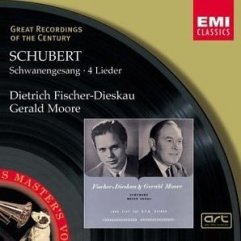Franz Schubert - Schwanengesang, 4 Lieder (Fischer-Dieskau) [2001]
Franz Schubert - Schwanengesang, 4 Lieder (Fischer-Dieskau) [2001]

1. Schwanengesang, D.957: I. Liebesbotschaft 2. Schwanengesang, D.957: II. Kriegers Ahnung 3. Schwanengesang, D.957: III. Fruhlingssehnsucht 4. Schwanengesang, D.957: IV. Standchen 5. Schwanengesang, D.957: V. Aufenthalt 6. Schwanengesang, D.957: VI. In Der Ferne 7. Schwanengesang, D.957: VII. Abschied 8. Schwanengesang, D.957: VIII. Der Atlas 9. Schwanengesang, D.957: IX. Ihr Bild 10. Schwanengesang, D.957: X. Das Fischermadchen 11. Schwanengesang, D.957: XI. Die Stadt 12. Schwanengesang, D.957: XII. Am Meer 13. Schwanengesang, D.957: XIII. Der Doppelganger 14. Schwanengesang, D.957: XIV. Die Taubenpost 15. Erlkonig, D.328 16. Standchen, D.889 17. Nacht Und Traume, D.827 18. Du Bist Die Ruh, D.776 Dietrich Fischer-Dieskau - baritone Gerald Moore - piano
There is more to being a great composer than just a purely musical gift, as Shaw said more than once, and there is more to these songs than just divine melody. However when all's said and done the musical gift is the basis of it all, and Schubert's purely musical endowment was, in my own view, the greatest that any human being ever had. Brahms had a word for it again, in a letter where he asks rhetorically `Does any composer so consistently scale the heights?' As with Mozart, there is a numinous quality to Schubert - we often seem to be in the presence of someone or something using the composer as a mouthpiece, but who or what this agency might have been we are left to wonder. On Schubert's tombstone it says that music has here buried a great treasure and still greater hopes. He would surely have achieved things completely unthinkable if he had lived. There are a few welcome extras here too. Moore was probably not the most proficient technician among accompanists, but his handling of the piano part in the Erlking, in its special way one of the hardest things in the entire literature of the piano, is a thing to remember. In one of his books he explains in detail the various expedients and shifts that he resorted to, but what puts his handling of it in a class of its own for me is first of all the pace he adopts, and secondly the sublime way in which he lets the tension relax without losing speed as he sets the scene for the Erlking's first song. I have heard those fiendish triplets given more evenly, but never quite the sense of drumming hooves conveyed so well, with four good marked beats to the bar and not too fast - the real sense of panic needs to be reserved for the end. Once again Fischer-Dieskau rises above the competition by the sheer sinister, evil beauty of his tone as the Erlking, with no cheap effects - Goethe's Erlking makes pretty speeches and Schubert's Erlking sings pretty tunes with no pantomime cackling. ---amazon.com
This EMI "Great Recordings of the Century" reissue contains a classic performance of Schubert's song cycle Schwanengesang D.957, and a further group of four songs, "Erlkönig" (D.328), "Ständchen" (D.957), "Nacht und Träume" (D.827), and "Du bist die Ruh" (D.776), performed by baritone Dietrich Fischer-Dieskau with Gerald Moore at the piano. Fischer-Dieskau "had only to sing one phrase before I knew I was in the presence of a master", wrote accompanist Gerald Moore (in his autobiography, Am I too loud?), referring to the first of his many recording sessions with Fischer-Dieskau in October 1951, a session that produced a number of the tracks on this recording. Their earliest documentation of Schubert's Schwanengesang (the first of Fischer-Dieskau's five) was assembled piecemeal from songs taped during four widely-spaced sessions held between 1951 and 1958. The recording itself may be said to have been a compilation, but then as John Steane points out in his booklet note, so is the cycle itself, drawing as it does on texts by six different authors.
It's also interesting to note that the performance was recorded at two different locations and was supervised variously by three producers; yet the overall result is thoroughly consistent, both sonically and musically. Through the years, Fischer-Dieskau's view of the cycle also seemed to alter very little, and so you'll find few points of divergence between this account and his 1971 Deutsche Grammophon remake, also with Moore. The DG transfer largely eliminates tape hiss, which still persists on this EMI remastering, though it's unlikely to affect listening pleasure. Both performances are largely without parallel, and indeed any rehearing of this EMI traversal should explain Moore's conviction that Fischer-Dieskau's artistry "takes me deeper into the heart of Schubert than I have ever been before." ---Michael Jameson, ClassicsToday
download: uploaded yandex 4shared mediafire solidfiles mega zalivalka filecloudio anonfiles oboom
Last Updated (Monday, 28 April 2014 13:11)








